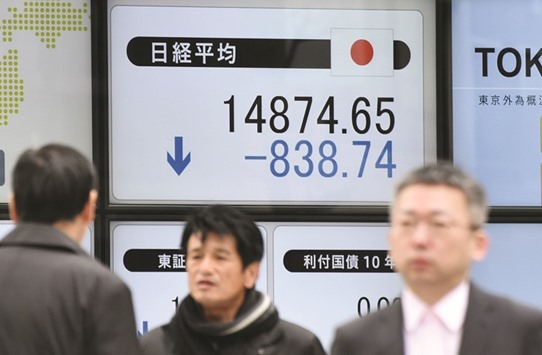A near 5% plunge in Tokyo led another Asian rout yesterday, bringing to an end one of the most painful weeks for global investors as fears about the world economy—and possible recession—stalk trading floors.
The losses in Japan came as the yen pushed to more than 16-month highs against the dollar. The rise led the government to say it would take “appropriate measures”, fuelling speculation officials were considering a currency market intervention.
However, oil soared more than 4% following a report that producers’ group Opec could be willing to cooperate on output cuts to stem a crash in prices that has roiled world markets.
Analysts say there is growing concern central banks are running out of ideas to provide support, with Sweden’s saying it would push its interest rate further into negative territory, weeks after Japan adopted the policy for the first time.
The measure—effectively charging lenders to park cash with it—follows similar moves by the European Central Bank and Switzerland.
And while Federal Reserve boss Janet Yellen told congress on Thursday it was unlikely the US would also need to adopt such extreme measures, she did leave open the possibility.
“Central bank policies and the uncertainty around their effectiveness is the big macro concern right now,” Leo Grohowski, chief investment officer of BNY Mellon Wealth Management in New York, told Bloomberg News.
“There’s a large disconnect right now between what the Fed might do and what they’re saying and what the market is expecting.”
Concerns that the upheaval on world markets will seep into the crucial US economy is adding to selling and financial stocks—particularly banks—are coming under intense pressure.
Tokyo’s Nikkei stocks plunged 4.8% by the close, giving up about 10% this week despite being closed on Thursday for a holiday.
Hong Kong fell 0.9% after a near 4r% fall on Thursday, Sydney shed 1.2% and Seoul’s KOSPI was 1.4% lower. South Korea’s small-cap Kosdaq index ended more than 7% lower, having been suspended briefly during the session when it dived 8%. The selling followed huge losses on Wall Street and in Europe.
Juichi Wako, a senior strategist at Nomura Holdings in Tokyo, said: “We’re not simply in a risk-off mode, the market’s fallen to the point of pricing in a recession in the US. The market is saying we’re worried no matter what Yellen says.” With investors pulling out of high-yielding assets, safe havens such as the yen are benefiting. The unit soared more than 7% against the dollar this year and is sitting around its highest levels since the end of October 2014.
The greenback touched below ¥112 at one point, from ¥112.39 late Thursday in New York.
Japan’s Finance Minister Taro Aso said “there have been some rough price movements so we are watching the market closely and will take appropriate measures if necessary”. The comments fed talk the central bank will step in for the first time since 2011 to prevent the yen going too high.
On oil markets West Texas Intermediate soared 4.5% and Brent added 4.2% after a Wall Street Journal report in which the United Arab Emirates’ energy minister said “everyone (in Opec) is ready to cooperate” on an output cut.

Pedestrians walk past a share prices board in Tokyo. The Nikkei 225 closed down 4.8% at 14,952.61 points yesterday.
